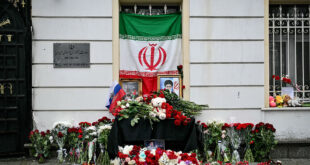World powers condemn nuclear stepTEHRAN (AP) — Iran came under increasing international condemnation — including from allies Russia and China — after announcing it enriched uranium for the first time, but it insisted it will push ahead to dramatically expand the programme that the United Nations had demanded it scrap.
Russia and China have been Iran’s top defenders at the UN Security Council, resisting pressure to slap sanctions on Tehran for its nuclear programme. Both countries repeated their stance Wednesday that negotiations were the way out of the standoff, but their frustration with Tehran was clear.
But Iranian President Mahmoud Ahmadinejad, who a day earlier announced the successful enrichment, dismissed the criticism from the United States and Europe. “Today, our enemies are angry because they could not block the path of our nation towards achieving nuclear technology. We have passed a main crossroad in this path,” Ahmadinejad said Wednesday in a speech broadcast on state-run television.
The UN Security Council has demanded that Iran stop all enrichment activity by April 28 because of suspicions the programme really aims to make weapons.
The head of the UN nuclear watchdog, International Atomic Energy Agency (IAEA), Mohammad Al Baradei, was heading to Iran for talks on Friday aimed at resolving the standoff.
US Secretary of State Condoleezza Rice telephoned Baradei to ask him to reinforce demands that Iran comply with its non-proliferation requirements.
“This is not a question of Iran’s right to civil nuclear power,” she said. “This is a question of… the world does not believe that Iran should have the capability and the technology that could lead to a nuclear weapon.”
In a nationally televised ceremony on Tuesday, Ahmadinejad announced that scientists had succeeded for the first time in enriching uranium to a level needed to fuel a reactor. He insisted Iran’s nuclear ambitions are peaceful and warned the West that trying to force Iran to abandon enrichment would “cause an everlasting hatred in the hearts of Iranians.” The process was carried out using 164 centrifuges, likely producing less than two kilogrammes of enriched uranium.
Enrichment can produce either fuel for a nuclear reactor or material for a warhead — but tens of thousands of centrifuges are needed to do either on any large scale.
Deputy nuclear chief Mohammad Saeedi said Wednesday Iran intends to build up the programme.
“We will expand uranium enrichment to industrial scale at Natanz,” he told state-run television. He said Iran has informed the IAEA that it plans to install 3,000 centrifuges at Natanz by late 2006 and that it will then expand to 54,000 centrifuges, though he did not say when.
He said using 54,000 centrifuges will be able to produce enough enriched uranium to provide fuel for a 1000-megawatt nuclear power plant like the one Russia is currently putting the finishing touches on in southern Iran.
In theory, that many centrifuges could be used to develop the material needed for hundreds of nuclear warheads if Iran can perfect the techniques for producing the highly enriched uranium needed. Iran, which is still thought to be years away from a full-scale programme, denies it intends to develop nuclear weapons, saying it only wants to generate electricity.
The nuclear programme has become a point of national pride in Iran — and Tuesday’s announcement was clearly aimed to fuel that feeling among Iranians. On Wednesday, state television aired footage of school principals ringing bells in the name of “national dignity and glory” to mark the success, and Iranians were also shown distributing candies and pastries in the streets and offices to celebrate.
China’s UN Ambassador Wang Guangya told reporters at United Nations headquarters that his country is “concerned about the events and the way that things are developing because … what they announced, certainly, actually, it is not in line with what is required of them by the international community.” Russian foreign ministry spokesman Mikhail Kamynin said: “We believe that this step is wrong. It runs counter to decisions of the IAEA and resolutions of the UN Security Council,” However, Russian Foreign Minister Sergey Lavrov warned against dramatising the situation and reiterated Moscow’s firm opposition to any military action against Iran.
In Berlin, Chancellor Angela Merkel’s government also said Iran’s announcement was cause for concern. “It is another step in the wrong direction by Iran,” German government spokesman Thomas Steg said.
“We are in the process of diplomatic regulation of this affair. We call on Iran to respect its obligations,” French government spokesman Jean-Francois Cope said.
The IAEA is due to report to the UN Security Council on April 28 whether Iran has met its demand for a full halt to uranium enrichment. If Tehran has not complied, the council will consider the next step. The US and Europe are pressing for sanctions against Iran, a step Russia and China have so far opposed.
 Eurasia Press & News
Eurasia Press & News



